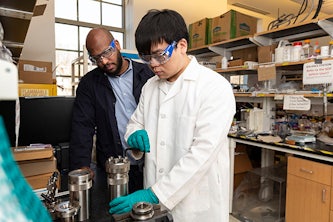It's easy to start your application.
Faculty & Research
Through the cross-disciplinary research of chemical, environmental, and biological processes in engineered systems, we can achieve cleaner air and water while meeting global demand for energy and goods. In the Department of Energy, Environmental & Chemical Engineering, we have the people, expertise and tools to support discoveries to address future global challenges.
Our department has active research in three areas
Energy

Covers the areas of sustainable energy systems; energy conversion & storage; and the interface of energy with environmental & chemical engineering
Environmental Engineering

Covers the areas of air quality & climate; environmental chemistry & microbiology; and water quality & resource recovery
Chemical Engineering

Covers the areas of advanced materials & nanotechnology; novel chemical processes & technologies; and synthetic biology & bioproduct engineering
About our research
The rapid pace of globalization provides unprecedented opportunity for developed and developing countries to restructure and grow their economies. However, society must meet the heightened demand for energy and goods through responsible, sustainable sources and with technologies that will have limited environmental impact, such as materials and devices for energy storage and electrochemical processing; novel methods of understanding the formation and impact of emission from energy and chemical processing on air and water quality; and new synthetic biology strategies for microbial production of fuels, chemical, and materials. We must create and improve the infrastructure required to ensure the highest quality of environmental and human health, which will require both fundamental and applied research in order to address current and future global challenges comprehensively.
Inside our labs
Assistant Professor Kimberly Parker’s research group is advancing the state of the science in engineering and chemistry to address emerging environmental challenges.
Professor Randall Martin's research group is at the interface of satellite remote sensing and global modeling, with applications that include population exposure for health studies.
The research, led by Associate Professor Marcus Foston, focuses on emerging technologies for exploitation of biomass as a sustainable source for energy, chemicals and materials production.




